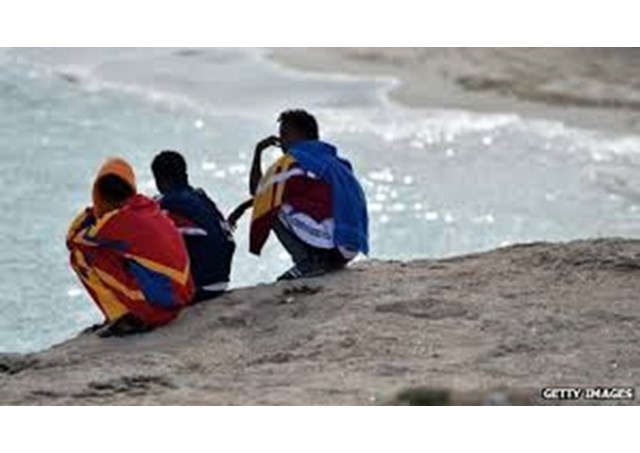
From Cote d’Ivoire to Lampedusa: the story of a survivor

(Vatican Radio) As the death toll of migrants crossing the Mediterranean Sea rises from hour to hour, as we speak of the “hundreds of thousands” (an estimated 350,000 in 2014) of people who undertake the journey of hope, the story of one man may shed some light on the story of so many others whom we refer to, too often, as numbers and statistics.
Listen:
His name is Mamadou Kovassi, he is 32 years old, and he is one of the “lucky” ones who have made it across the Saharan desert and then across the Mediterranean Sea in search of a better life.
He decided to leave his country, Cote d’Ivoire in west Africa in 2006 when his political ideas started to make things complicated for him. He wanted to become a language teacher and thought he would have a better chance of doing so in Europe.
Almost 10 years have gone by since that that terrible journey with all the trials he had to face, both during and afterwards, as he sought work and livelihood in Europe. “Sometimes, he says, it is better to stay in the war in your country and to die: there is no hope for us immigrants who are living in Europe, there is no hope”.
Mamadou speaks of his journey to Europe and of how he and his companions were exploited from step one:
“Most of the thousands immigrants who reached Italy are obliged to pay – me I paid twice! First I paid to cross the desert and then again when I reached the boat they said the weather is not good and the following day I had to pay again”.
In order to reach Libya from Cote d’Ivoire, Mamadou says he walked or got lifts through Ghana, Burkina Faso, Niger and then spent three weeks crossing the desert:
“It’s a bad journey, very hard and you have to keep on paying”
Mamadou tells of how the traffickers – belonging to a well organized organization with connections throughout the way – charge for water in the desert, and ask for money again and again, threatening to kill and to abandon the refugees.
“It was very hot, and in the desert a bottle of water costs 25 euros” he says.
He was poor but he paid everything he had to make the journey: about 300 euros to cross the desert, while the crossing to Lampedusa cost him another 2,400 dollars:
Mamadou speaks of how he and his companion were robbed on the way and of how he witnessed one of them being shot and killed because he refused to give his money to the robbers. But the worst thing – he said – is how the women are treated:
“It is unbelievable. Those people don’t care: they use women like animals” – Mamadou describes how in the desert they obliged the women to sleep with them at gunpoint forcing everyone else to wait and obey them, or else…
“What I saw, how they treat women is not right…”
Mamadou made his journey in summer time. He is one of the lucky ones who made it to the Island of Lampedusa.
In Lampedusa he was registered and sent to Rome where some nuns taught him Italian.
According to legal procedures, he was listened to by a commission but the Italian
authorities refused his request to stay. He ended up looking for work in Naples and
in Caserta where he slept rough or received some support from Caritas. He went to
one of the many roundabouts where immigrant workers wait in the early morning for
employers to offer them jobs and ended up picking tobacco. In this situation – he
says – you end up working 12 hours a day and earning barely enough to pay for a bed
and some bills. He points out that employers know that they can do “what they want
with you when you’ve not got your documents”.
Mamadou finally got his papers when the Italian Government created an amnesty for
migrants. He says he still dreams of a future and with his work as a mediator in an
organization that fights for the rights and dignity of immigrants called “Movimento
Immigrati e Rifugiati di Caserta” he says he feels he can help people change their
lives.
“I know it is not easy, we have to prove on our own, and we have to fight to show that we need change. The change we need is not for us but for future generations. What we are doing will give better fruits, helping Italian people to change their minds… even if we are not going to change everybody we will get some good ‘changements’… I hope”.
| All the contents on this site are copyrighted ©. |


